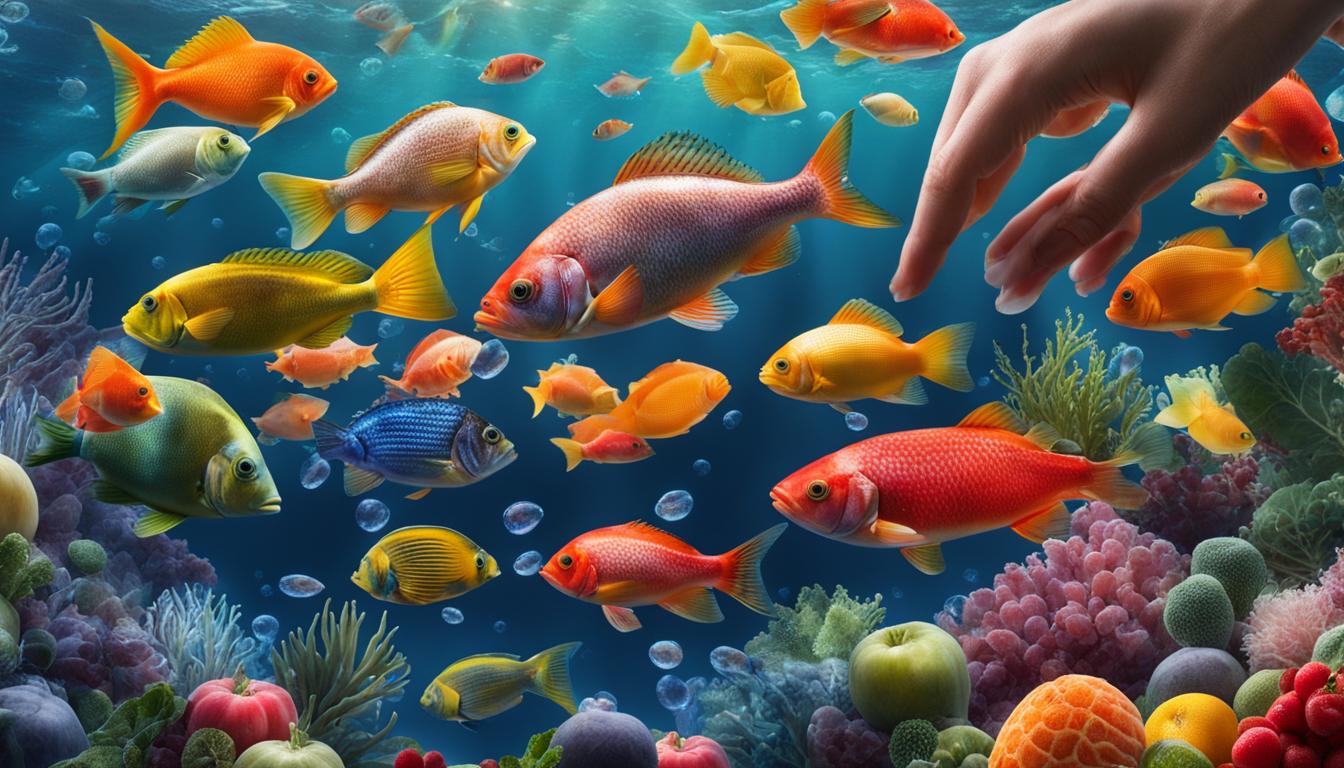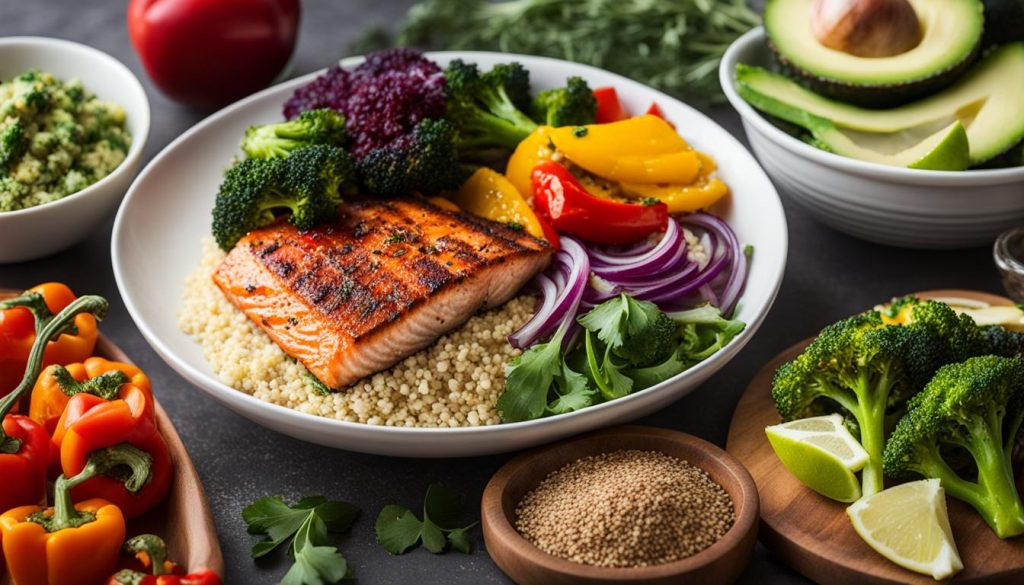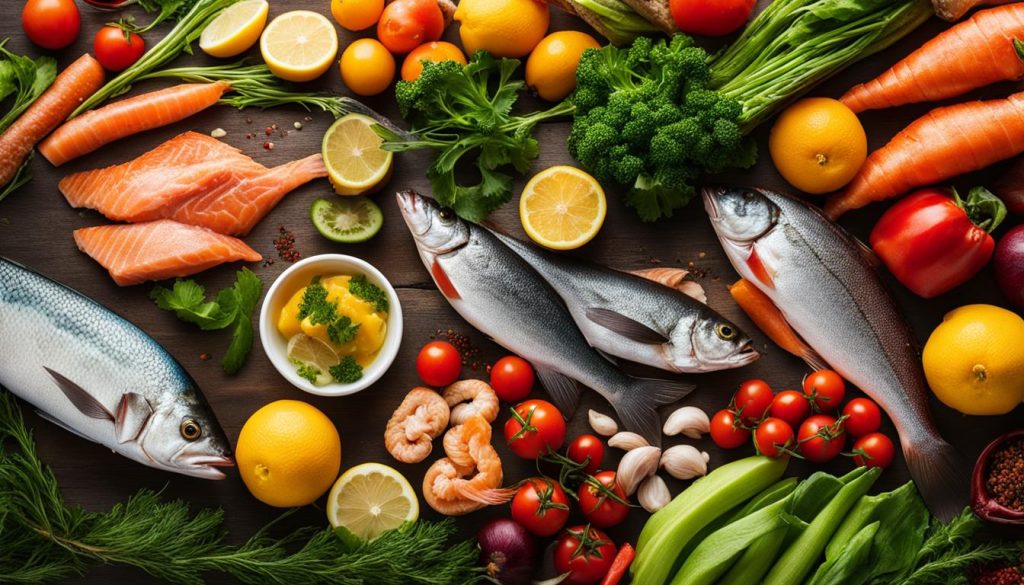All About the Pescetarianism Diet. A Simple Guide!

Welcome to my guide on the pescetarianism diet. In this article, I will provide you with all the information you need to know about this unique eating plan. Whether you're considering becoming a pescetarian or simply curious about the benefits and meal ideas, I've got you covered.
A pescetarian diet is a vegetarian diet that includes fish and other seafood. It excludes meat and poultry but allows for the consumption of eggs and dairy products. This diet is plant-based, focusing on whole grains, legumes, fruits, vegetables, nuts, and seeds. Fish and seafood serve as the primary source of protein, providing essential nutrients to support a healthy lifestyle.
The pescetarian diet offers numerous health benefits, including a lower risk of obesity, heart disease, and diabetes. Additionally, it is environmentally friendly as fish and seafood have a lower carbon footprint compared to other animal meats.
Key Takeaways:
- 1. The pescetarianism diet is a vegetarian diet that includes fish and seafood.
- 2. Pescetarians do not consume meat or poultry but can enjoy eggs and dairy products.
- 3. This diet emphasizes plant-based foods like whole grains, legumes, fruits, vegetables, nuts, and seeds.
- 4. Fish and seafood provide essential nutrients and are the main source of protein in a pescetarian diet.
- 5. The pescetarianism diet offers various health benefits, including a lower risk of obesity, heart disease, and diabetes.
Health Benefits of a Pescetarian Diet
https://www.youtube.com/watch?v=IZdvlOAWy6o
Research has shown that a pescetarian diet offers numerous health benefits. It has been associated with a lower risk of obesity and chronic diseases such as heart disease and diabetes. Pescatarians tend to consume more fiber, which promotes a healthy gut, reduces the risk of heart disease and diabetes, and helps maintain a healthy weight.
"Following a pescetarian diet can significantly reduce the risk of developing cardiovascular diseases. The inclusion of fish and seafood in the diet provides omega-3 fatty acids, which have been shown to improve heart health by reducing inflammation and lowering blood pressure," says Dr. Lisa Johnson, a nutrition expert.
Additionally, the inclusion of fish in the diet provides omega-3 fatty acids, vitamin B12, and other nutrients that can be harder to obtain in a vegan diet. Omega-3 fatty acids are essential for brain health, reducing the risk of cognitive decline and improving mood. Vitamin B12 is crucial for nerve function and the production of red blood cells. Compared to a standard vegetarian diet, a pescetarian diet offers more flexibility and additional nutrition.
Tips for Following a Pescetarian Diet
Switching to a pescetarian diet can be a positive and healthy lifestyle change. Here are some tips to help you get started:
- Gradually transition: Start by incorporating more plant-based foods into your meals and gradually reduce the amount of meat and poultry you consume.
- Explore seafood options: Experiment with different types of fish and seafood to find the ones you enjoy the most and that are sustainably sourced.
- Plan your meals: Take some time to plan your meals in advance, ensuring they are balanced and include a variety of nutrient-rich foods.
- Include plant-based protein sources: To ensure adequate protein intake, incorporate plant-based protein sources such as legumes, nuts, and seeds into your diet.
- Consult a healthcare professional: If you have any concerns or specific dietary needs, it is recommended to consult with a healthcare professional or registered dietitian for personalized guidance.
By following these tips and gradually making changes to your eating habits, you can successfully adopt a pescetarian diet and enjoy its health benefits.
What Do Pescatarians Eat?

Pescatarians follow a diet that is primarily plant-based, but also includes fish, seafood, eggs, and dairy products. This combination allows for a wide variety of delicious and nutritious meals. Pescatarians can enjoy a range of pescetarian meal ideas and pescetarian recipes that showcase the flavors of both plant-based ingredients and seafood.
When it comes to meal ideas, pescatarians can start their day with a vegetable omelet packed with colorful veggies like spinach, peppers, and mushrooms. For a refreshing and nutritious snack, pescatarians can blend yogurt or kefir with fruits to create delicious smoothies. Another option is to have nut- and seed-based granola bars for a quick and energy-boosting snack.
When planning a pescetarian shopping list, it's important to choose high-quality ingredients. Opt for whole-grain bread, fresh fruits, and vegetables that provide essential vitamins, minerals, and fiber. When selecting fish and seafood, look for sustainably sourced options that support environmentally friendly practices. With these ingredients in hand, pescatarians can create a wide array of flavorful dishes that celebrate the best of both plant-based and seafood ingredients.
Pescetarian Meal Ideas:
"I love starting my day with a vegetable omelet filled with sautéed spinach, bell peppers, and mushrooms. It's a nutritious and satisfying way to get my day started."
"One of my go-to snacks is a refreshing smoothie made with yogurt, mixed berries, and a splash of almond milk. It's a tasty way to stay energized throughout the day."
"I always keep a batch of homemade nut- and seed-based granola bars on hand. They're a great grab-and-go snack that keeps me fueled and satisfied."
Benefits of Adding Fish to a Vegetarian Diet

Adding fish to a vegetarian diet provides several benefits. Fish is an excellent source of omega-3 fatty acids, which are beneficial for heart health, brain function, and mood. As a pescetarian, I've found that including fish in my diet has improved my overall well-being. The omega-3s found in fish can help reduce inflammation in the body, lower blood pressure, and decrease the risk of heart disease. These fatty acids have also been linked to improved cognitive function and a reduced risk of depression.
Another advantage of incorporating fish into a vegetarian diet is the high-quality source of lean protein it offers. While plant sources like beans and tofu provide protein, fish is a complete protein, meaning it contains all the essential amino acids our bodies need. This makes it an ideal choice for individuals looking to maintain or build muscle mass.
"Fish and seafood are rich in nutrients like vitamin B12, zinc, selenium, and various B vitamins. Including fish in a vegetarian diet gives individuals more options and variety in their meals, allowing for a well-rounded and nutritious eating pattern."
One of the main reasons why I chose to follow a pescetarian diet is the variety it provides compared to a strictly vegetarian diet. By including fish in my meals, I have a wider range of options when it comes to cooking and eating out. This variety not only keeps me from getting bored with my diet but also ensures that I am getting a diverse array of nutrients that are essential for optimal health.
In summary, the benefits of adding fish to a vegetarian diet are numerous. From the omega-3 fatty acids for heart and brain health to the high-quality protein for muscle maintenance, fish offers unique nutritional advantages. By incorporating fish into a pescetarian diet, individuals can enjoy a wide range of meal options and ensure they are meeting their nutrient needs. Whether you're a long-time vegetarian looking to add more variety or someone considering transitioning to a pescetarian diet, incorporating fish can be a beneficial and enjoyable choice.
Drawbacks of the Pescetarian Diet
While the pescetarian diet offers many benefits, it's important to be aware of some potential drawbacks. One potential downside is the risk of overconsuming carbohydrates if relying heavily on processed grains. It's important to choose whole-grain options and prioritize a diverse range of plant-based foods to maintain a balanced diet and manage weight effectively.
"A pescetarian diet can be a healthy choice, but it's crucial to pay attention to the types of fish consumed," says nutritionist Jane Smith. "Certain fish, especially larger species, can contain higher levels of mercury and other environmental toxins. It's important to choose low-mercury fish and seafood options and be cautious of intake, particularly for pregnant and nursing women, young children, and individuals with health conditions."
In addition to potential mercury contamination, another consideration is the environmental impact of consuming fish. While fish and seafood generally have a lower carbon footprint compared to other animal meats, overfishing and unsustainable fishing practices can harm marine ecosystems. When following a pescetarian diet, it's advisable to choose sustainably sourced fish and seafood to support a more sustainable food system.
"It's essential to ensure a balanced diet as a pescetarian," says nutritionist Emily Johnson. "While fish provides valuable nutrients like omega-3 fatty acids and vitamin B12, it's crucial to include a variety of plant-based foods to meet all nutritional needs. Emphasize fruits, vegetables, legumes, nuts, and seeds alongside fish and seafood for a well-rounded eating pattern."
Redefining the Pescetarian Diet
While there are some drawbacks to the pescetarian diet, they can be mitigated through mindful food choices and a balanced approach to eating. By paying attention to the types of fish consumed, choosing sustainable options, and incorporating a variety of plant-based foods, individuals can embrace the pescetarian lifestyle while maximizing its benefits.
Conclusion
The pescetarianism diet provides a flexible and health-conscious approach to eating. By incorporating more plant-based foods into your meals and choosing sustainably sourced fish and seafood, you can easily start a pescetarian diet plan. This lifestyle change offers numerous benefits, including weight management support and a reduced risk of chronic diseases.
To begin your pescetarian journey, it's important to focus on whole foods and maintain a balanced approach. Include a variety of fruits, vegetables, whole grains, legumes, nuts, and seeds in your diet while incorporating fish and seafood as a main protein source. This combination allows you to enjoy the advantages of a plant-based diet while still enjoying the nutritional benefits that fish and seafood provide.
Starting a pescetarian diet can be a simple and beneficial choice for a more sustainable food system. By adopting this diet, you contribute to a healthier lifestyle and help minimize the carbon footprint associated with other meat-based diets. Remember to pay attention to your nutrient intake and choose low-mercury fish options, especially if you are pregnant, nursing, or have certain health conditions.
Embrace the pescetarianism diet and discover a world of delicious and nutritious meal options. With its flexibility and health benefits, the pescetarian diet is a wonderful choice for those looking to improve their overall well-being while also promoting a more environmentally friendly way of eating.
FAQ
What is a pescetarian diet?
A pescetarian diet is a vegetarian diet that includes fish and other seafood. It excludes meat and poultry but includes eggs and dairy products.
What are the health benefits of a pescetarian diet?
A pescetarian diet has been associated with a lower risk of obesity, heart disease, and diabetes. It provides essential nutrients like omega-3 fatty acids and vitamin B12.
What can pescatarians eat?
Pescatarians primarily consume plant-based foods such as whole grains, legumes, fruits, vegetables, nuts, and seeds. They also include fish, seafood, eggs, and dairy products in their diet.
Why is adding fish to a vegetarian diet beneficial?
Fish is a great source of omega-3 fatty acids and lean protein. It offers essential nutrients that may be harder to obtain from plant sources alone, such as vitamin B12 and zinc.
What are the drawbacks of the pescetarian diet?
It can be easy to overconsume carbohydrates if relying on processed grains, and some fish may contain mercury and other toxins. Pregnant women and individuals with certain health conditions should be cautious about their fish intake.
How do I start a pescetarian diet?
To start a pescetarian diet, you can incorporate more plant-based foods into your meals, choose sustainably sourced fish and seafood, and plan your shopping list accordingly.